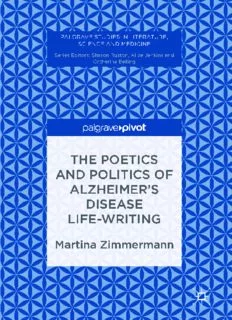
The Poetics and Politics of Alzheimer’s Disease Life-Writing PDF
Preview The Poetics and Politics of Alzheimer’s Disease Life-Writing
Palgrave Studies in Literature, Science and Medicine Series Editors Sharon Ruston Dept. of English and Creative Writing Lancaster University, Lancaster, United Kingdom Alice Jenkins School of Critical Studies University of Glasgow, Glasgow, United Kingdom Catherine Belling Feinberg School of Medicine, Northwestern University Chicago, Illinois, USA Palgrave Studies in Literature, Science and Medicine is an exciting new seriesthatfocusesononeofthemostvibrantandinterdisciplinaryareasin literary studies: the intersection of literature, science and medicine. Comprised of academic monographs, essay collections, and Palgrave Pivotbooks,theserieswillemphasizeahistoricalapproachtoitssubjects, inconjunctionwitharangeofothertheoreticalapproaches.Theserieswill cover all aspects of this rich and varied field and is open to new and emerging topics aswell asestablished ones. Editorial board: Steven Connor, Professor of English, University of Cambridge, UK; Lisa Diedrich, Associate Professor in Women’s and Gender Studies, Stony Brook University, USA; Kate Hayles, Professor of English, Duke University, USA; Peter Middleton, Professor of English, University of Southampton, UK; Sally Shuttleworth, Professorial Fellow in English, St Anne’s College, University of Oxford, UK; Susan Squier, ProfessorofWomen’sStudiesandEnglish,PennsylvaniaStateUniversity, USA;MartinWillis,ProfessorofEnglish,UniversityofWestminster,UK. More information aboutthisseries at http://www.springer.com/series/14613 MartinaZimmermann The Poetics and Politics ’ of Alzheimer s Disease Life-Writing MartinaZimmermann King’sCollege,London London,UnitedKingdom PalgraveStudiesinLiterature,ScienceandMedicine ISBN978-3-319-44387-4 ISBN978-3-319-44388-1(eBook) DOI10.1007/978-3-319-44388-1 LibraryofCongressControlNumber:2016952436 ©TheEditor(s)(ifapplicable)andTheAuthor(s)2017.Thisbookisanopenaccesspublication. OpenAccess ThisbookislicensedunderthetermsoftheCreativeCommonsAttribution 4.0InternationalLicense(http://creativecommons.org/licenses/by/4.0/),whichpermits use,sharing,adaptation,distributionandreproductioninanymediumorformat,aslongas you giveappropriate credittothe originalauthor(s)andthe source,providealink tothe CreativeCommonslicenseandindicateifchangesweremade. Theimagesorotherthirdparty materialinthisbookare includedin thebook’sCreative Commonslicense,unlessindicatedotherwiseinacreditlinetothematerial.Ifmaterialisnot includedinthebook’sCreativeCommonslicenseandyourintendeduseisnotpermittedby statutoryregulationorexceedsthepermitteduse,youwillneedtoobtainpermissiondirectly fromthecopyrightholder. Theuseofgeneraldescriptivenames,registerednames,trademarks,servicemarks,etc.inthis publicationdoesnotimply,evenintheabsenceofaspecificstatement,thatsuchnamesare exemptfromtherelevantprotectivelawsandregulationsandthereforefreeforgeneraluse. Thepublisher,theauthorsandtheeditorsaresafetoassumethattheadviceandinformation in this book are believed to be true and accurate at the date of publication. Neither the publishernortheauthorsortheeditorsgiveawarranty,expressorimplied,withrespectto thematerialcontainedhereinorforanyerrorsoromissionsthatmayhavebeenmade.The publisherremainsneutralwithregardtojurisdictionalclaimsinpublishedmapsandinstitu- tionalaffiliations. Coverpattern©MelisaHasan Printedonacid-freepaper ThisPalgraveMacmillanimprintispublishedbySpringerNature TheregisteredcompanyisSpringerInternationalPublishingAG Theregisteredcompanyaddressis:Gewerbestrasse11,6330Cham,Switzerland A CKNOWLEDGEMENTS The template for this volume was laid down during my study towards an MA in Literature and Medicine at King’s College London. The participa- tioninthiscoursewasgenerouslysupportedbytheLesmüllerFoundation, Germany.The researchunderpinningthe reworking and expandingofmy MA dissertation with a view to publication has been undertaken with generous funding from the Wellcome Trust [099351/Z/12/Z], which alsoenablesopenaccesspublicationofthisbook. I am sincerely grateful to Brian Hurwitz, Neil Vickers and James Whitehead.Brian’s andNeil’s enthusiasm andcuriosity inwelcoming me to their MA programme carried me a long way on a steep learning curve and the course’s formidable reading list. I am particularly thankful to Brian, who was my personal tutor throughout the course: he tirelessly challenged my claims, and set the bar high for what could pass as truly interdisciplinarywriting.ToNeil,Iowethanksforinsightfuldiscussionon illnesslife-writingaswellaspsychoanalyticalperspectivesonthedementia experience;andtoJamie,Iamindebtedfordeepeningmycomprehension ofconceptssuchasclosureandnarrativetruth.Allthreeofferedinvaluable criticism and helpful comments on drafts of this manuscript. Their var- iously differing perspectives on the Health Humanities have significantly shaped my own thinking about interdisciplinarity, and are inspiration to persevereat the boundarybetween theSciences andthe Humanities. I began active research in the Health Humanities during full-time employment in a Science department, and could not have embarked on this work without approval from my Science mentor Jochen Klein. As his open-mindedness has given me the space to try out new teaching v vi ACKNOWLEDGEMENTS approaches, his magnanimous nature granted me the time to enrol on this course. Only in the awareness of his quiet confidence that I would be able to follow my academic duties and research activities, while simultaneously seizing this opportunity, could I find the mental space to dedicate myself to this experience. I could not have hoped or wished for more support. IalsothankSusanGreenfieldandMartinWestwellfortheirbackingand encouragement inapplying forthe MAprogrammeat King’s. Throughoutworkingonthisbook,Ihadtheopportunitytoteachillness narratives in a Pharmaceutical/Medical Sciences as well as a Health Humanitiescontext.Theexperienceofpracticalandconceptualdisciplinary limitsandlimitationsconfirmsmybelievethattheHealthHumanitiesmust eventuallycomplementtheSciencesfromwithin;thatonlyafirmscientific grounding will enable an appreciation of the Health Humanities that is removedfromdiscoursesofusefulness.Iamindebtedtoallundergraduate studentswhoenteredintoexploringafieldoutsidetextbookphysiologyand pharmacology,bothinthePharmaceuticalSciencesDepartmentatGoethe University Frankfurt and at the School of Biomedical Sciences at King’s. Teaching at graduate level in the English Department at King’s, and dis- cussing my research in several postgraduate seminars in Frankfurt enor- mously enriched my understanding of what the Sciences and Humanities eachtakeforgranted–intermsofmethodologyasmuchasterminology. In my Antrittsvorlesung as Privatdozentin, I had occasion finally to presenttomySciencecolleaguestheinterdisciplinaryteachingapproaches in Pharmaceutical Care that had paralleled my scientific research in Frankfurt. Among those attending, I particularly wish to thank Jennifer Dressman, Gunter Eckert, Michael Karas, Paul Layer, Rolf Marschalek, Martin PosandThomas Prisnerfortheirinterest andobservations. IalsopresentedsomeofmyresearchandteachingideasatarangeofHealth Humanitiesmeetings.Thecommentsofmanyhaverefinedandfurthermoti- vatedthiswork;IspecificallywanttomentionJensBrockmeier,MichaelClark, Peter Frommelt, Eileen Gillooly, Brian Glasser, Nortin Hadler, Terry Holt, Hannah Landecker, Tom Linden, Gordon McMullan, Maria Medved, ColumbaQuigley,BarrySaunders,DavidStoneandJaneThrailkill. Ialsoextendmygratitudetotheanonymousreaderfortheconstructive and perceptive consideration of my work; to Ben Doyle for editorial supportatPalgrave;andtothosewhobelievedinthisresearchlongbefore it had taken shape as this book: Carolin Duttlinger, Joe Harris, Peter Howarth and,most ofall, Steven Brown. C ONTENTS 1 Introduction 1 Alzheimer’sDiseaseand Narrative Theory:Is ‘Narrating Dementia’an Oxymoron? 7 Conscientious Criticism:Mapping My Readingof Dementia Life-Writing 12 Sifting Dementia Narratives 19 2 OfWivesand Daughters:Stereotypes ofthe CaringFemale? 23 The LostIdentity: Alzheimer’s Disease,Adult Children and the Past 27 Times AreChanging:‘Mothers’and Lovers 33 PerceivedCaregiverBurdenandPatientIdentityConditionEach Other 40 3 Froma ‘Care-Free’ Distance:Sons Talking AboutCultural Concepts 49 Body and Mind:The Patientas Object 53 Alzheimer’sand Aging: ThePatient asSubject 62 Historical, Culturaland PersonalContextInfluence Attitudes to Dementia 68 vii viii CONTENTS 4 AboutTradition andTriumph:PatientsPopularise DementiaNarrative 75 Tradition Sells: TheJourneyinto Darkness 78 Form and Contents:NarratingAlzheimer’s versus ‘Account-Ability’ 83 Collaborative Writing MeetsSocietal Normsand Political Intentions 91 5 OnReclaiming Authority: TheEnabling Discourseof Alzheimer’sDisease 95 Times AreChangingII: Patient Activism 98 Identity within Dementia: ThePatient asPostmodern Prophet? 103 The Patient’sWorld AdvisesCaregiver andSociety 110 6 Conclusion 117 Alzheimer’sDiseaseNarratives Today: NewMedia, Germane Stories 119 Stories ofDementia: Pedagogical, Political,Representative 128 Bibliographyof DementiaNarratives 133 Works Cited 141 Index 157 CHAPTER1 Introduction Critically Reading Dementia Narratives: Amplifying Advocacy Abstract Theintroductiongivesanoverviewonsociopoliticalandresearch- relateddevelopmentsregardingdementia,andattemptsexplanationsforwhy the interest in dementia of critical scholarship continues to be very limited and particularly focused on caregiver accounts. It illustrates that an under- standing of the obvious neglect of dementia patient narratives sheds some light onto the ethical implications and challenges of critically reading such narratives: these narratives seem least of all fit to match classical survivor illness literature, and serious impairment in the ability to tell or understand storieshasbeentakenasmotivationtoneglectpatientnarratives.Approaches highlightingtheimportanceofpre-narrativeidentityandagrowingbodyof psycho-philosophical work demand a closer scrutiny of patient narratives, whichwouldalsoamplifytheirauthor-narrators’advocacy. Keywords Advocacy (cid:1) Book market (cid:1) Demography (cid:1) Dysnarrativia (cid:1) Narrative identity ©TheAuthor(s)2017 1 M.Zimmermann,ThePoeticsandPoliticsofAlzheimer’sDisease Life-Writing,PalgraveStudiesinLiterature,ScienceandMedicine, DOI10.1007/978-3-319-44388-1_1
Description: